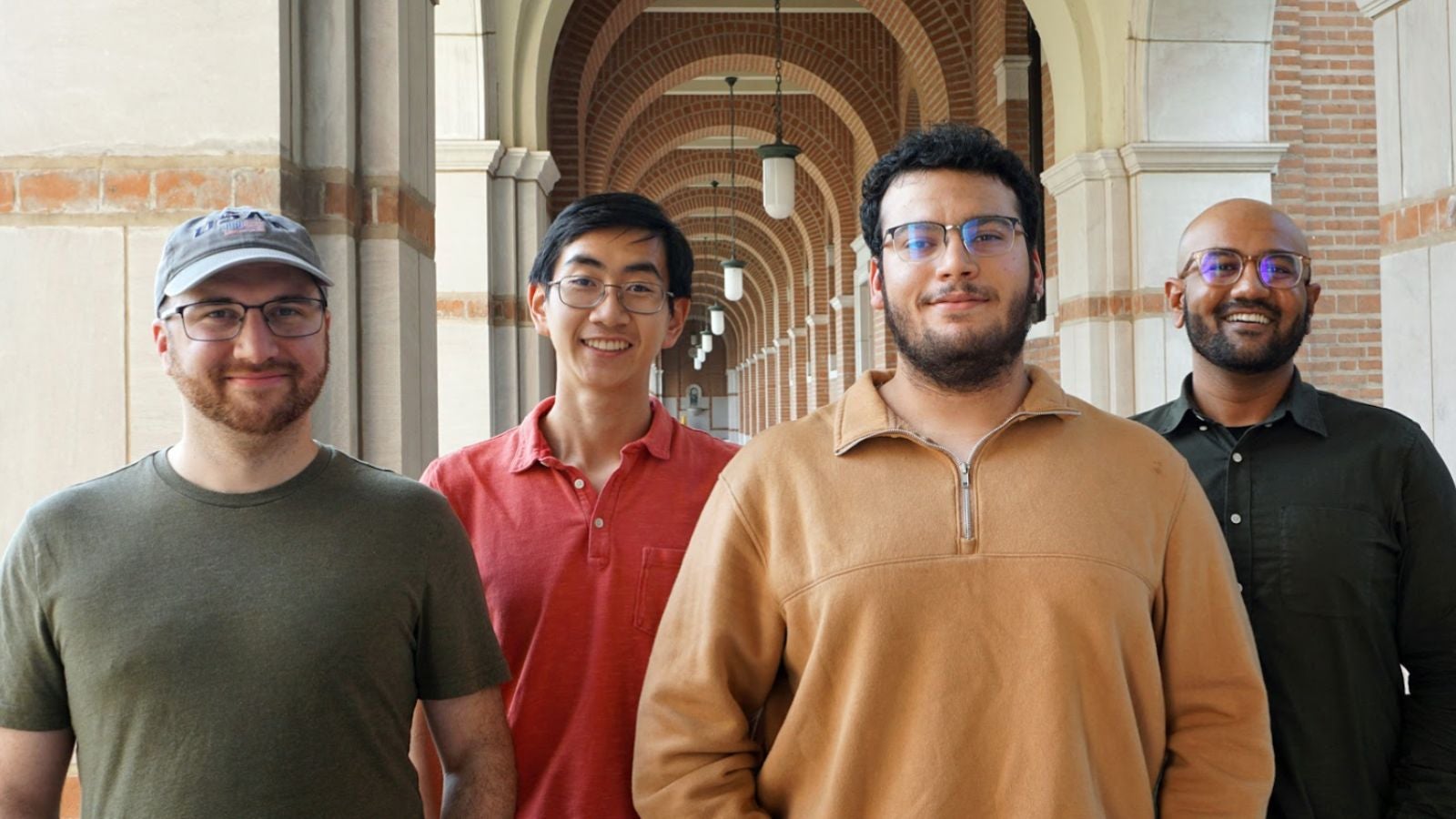A team of Rice University computer science students mentored by Assistant Professor Tirthak Patel produced one of the most innovative solutions in the 2023 Quantum Computing for Drug Discovery Challenge, an outcome that delighted the three students and faculty member. The team is composed of Rice juniors Jason Han and Hamza Shili, plus Ph.D. student Jason Ludmir.
"When I learned about the ACM/IEEE Quantum Computing for Drug Discovery Challenge at ICCAD, I immediately brought it to my students' attention. Quantum computing holds the potential to impact drug discovery significantly, offering accelerated computational power to solve complex problems in molecular modeling and simulation. So, this was an important challenge to work on, as the students agreed,” said Patel.
Together, they devised a solution to identify the ground state energy of the hydroxyl cation. This molecule has the potential to serve as a central axis for a variety of drug interactions. Their solution uses a well-known, high-accuracy algorithm stemming from coupled-cluster theory (UCCSD); however, this algorithm generates lengthy code, which, when run on near-term quantum computers, produces largely erroneous results. The key insight in their solution is that the generated code can be approximated using much smaller code with the use of quantum mathematical transformations and learning-based optimizations. This approximate, smaller code, when run on near-term computers, generates low-error, high-fidelity results.

“This was my first semester doing quantum computing research with Professor Patel, and he provided us with immense support,” said Han. “I remember our team met in his office one Wednesday, where we took out a marker and sketched an idea for a solution. I relished implementing the algorithm and optimizing our workflow in various ways until we reached a solution we were satisfied with.”
“When I heard that our solution placed 6th internationally, earning us an Honorable Mention and a finalist position for the Innovation Award, I was surprised and excited.”
One of my biggest takeaways is that you don't have to be a researcher in a field for years to solve challenging problems: a clever idea combined with careful reasoning and optimization can yield an elegant, effective solution.
Han represented the team at ICCAD but said their success is due to the contributions of every member of the team, “especially Professor Patel. Without his dedicated mentorship, support, and insights, none of this would have been possible.”

Before joining the team, Shili’s overlapping interests in finance and computer science revolved around harnessing cutting-edge technologies to resolve intricate problems. He said the ICCAD challenge — applying quantum computing to drug discovery — is a testament to how advanced computing paradigms can redefine industries beyond their traditional bounds, even in the current noisy intermediate-scale quantum (NISQ) state.
“The NISQ era's promise of harnessing quantum computing to efficiently simulate intricate molecular structures resonates with my belief in using computational power to generate actionable insights,” said Shili. “Our approach of taking highly accurate, very deep code and reducing its depth reflects the computational approach I admire and employ in finance and data science.

Ludmir, a PhD student in Patel’s lab, said “My interest in quantum computing was first sparked by reading about a quantum search algorithm called Grover's algorithm. In traditional computing, searching for a specific item in a list of items is pretty slow. Grover's algorithm accelerates exhaustive search tasks by amplifying specific amplitudes instead of searching through items one by one.”
“There are a large number of fields and computing problems where quantum computing can be applied. From this competition alone, it's evident how quantum computing can determine the ground state of a particular molecule, information that is critical to understanding how molecules function. Modeling molecular behavior can be extremely computationally expensive with traditional computers: this is one place where quantum computers have an edge.”

Patel was no stranger to ICCAD, jointly sponsored by IEEE and ACM to gather computer scientists and engineers interested in exploring innovative design automation developments. One of his early Ph.D. papers, DisQ, was a finalist for the ICCAD 2020 Best Paper Award.
According to Patel, this year’s ICCAD challenge was designed as a research and development competition lasting several months and focused on drug discovery-related problems best solved with quantum algorithms. The worldwide challenge was open to multi-member teams of industry professionals and students alike, with the top teams invited to present their solutions at the conference.
“The Rice students worked toward designing and implementing a solution with exceptional dedication and creativity,” Patel said. “Being recognized as the team submitting one of the most innovative solutions highlights the significance and value of our solution and has further inspired us to continue to push the boundaries of what's possible in this exciting field."

